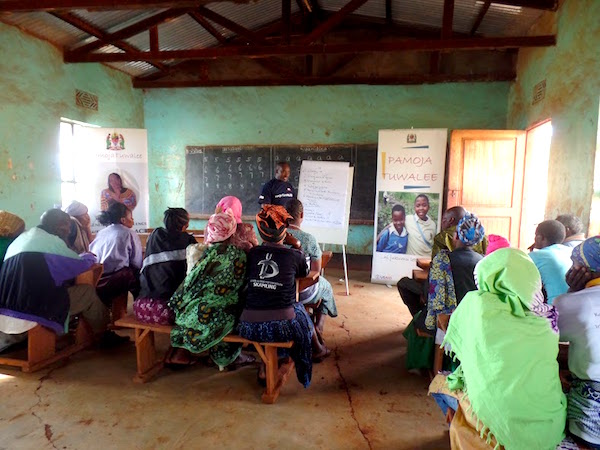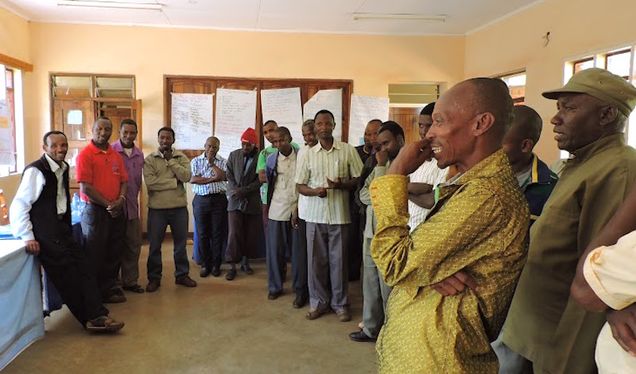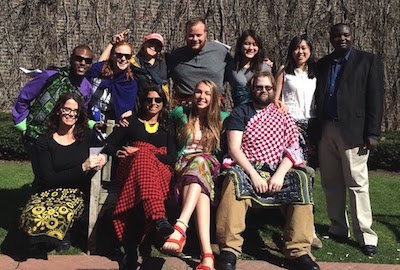Promoting Gender Equality in Tanzania.

MPH student Nelson Holmes originally planned to do his practicum on infectious disease. But after lending some technical support to a gender-based violence (GBV) intervention in the northern Arusha Region of Tanzania, he quickly changed his mind. “Who can shake their head at trying to reduce gender-based violence?” he says.
So, with support from the Santander Universities Scholarship Program, Holmes went to Arusha for a practicum with Together to End Violence Against Women (TEVAW).
In Tanzania, a 2010 survey found that 52.3 percent of male respondents and 58.3 percent of female respondents thought it was acceptable for a husband to beat his wife. That and other sexist beliefs manifest in GBV, heightened rates of HIV transmission, and other issues directly affecting public health.
TEVAW is a research project that tries to tease out the effectiveness of different methods to challenge harmful norms around gender. Associate Professor of Global Health Lisa Messersmith leads the study, which is implemented by a partnership between the Boston University Center for Global Health and Development and World Education’s Bantwana program, and funded by the South Africa Medical Research Council.
Across nine villages in the Arusha Region, the study looks at women over 18 years old who live with a male partner. All of the women in the study are already part of World Education’s savings and lending groups, called LIMCA groups, which provide training on business skills, literacy, child nutrition and health, child protection, intimate partner violence, and HIV prevention.
For one-third of the participants in the TEVAW intervention, male partners participated in male peer group workshops exploring gender norms, intimate partner violence, and HIV prevention.
For another third of participants, male partners participated in the male peer group workshops, and the couples also participated in community dialogues on the same topics.

“We were interested to see if we could conduct a study to test the preliminary effect” of this intervention, Messersmith says, “changing men’s attitudes toward perpetration of violence.”
Comparing attitudes before and after the program with the Gender Equitable Men (GEM) scale requires inputting and analyzing a heap of data. That was where Holmes came in.
“They were using software to capture the different remarks on their surveys, and I started just doing some of the nitty-gritty with that,” says Holmes, who came to SPH with with plenty of experience in large digital scan projects and paper-to-digital-records conversion.
“The software was having some issues, and as I was troubleshooting it and getting more involved the opportunity arose to go and help on the transfer of data of new information on the Tanzania side.”
By the time he arrived for the practicum, he knew gender-based violence was an issue he wanted to continue to work with.
“It’s a great thing to be involved in,” Holmes says. “I’m actually about to start a research assistant position doing something similar for Bangladesh, so I’m excited to work in this area.”
In addition to assisting with the software and helping fix snags in data entry and transfer, Holmes also worked with a World Education intern to translate 106 in-depth interviews from the studies. He says he was excited to see how much he had learned in a Swahili crash course at BU this spring, and that he looks forward to continuing to improve his language skills in an SPH Swahili course this fall.
“We were really fortunate and pleased that Nelson was able to get support from Santander” to assist the study in Tanzania, says Messersmith. She says his help was invaluable to the study—and that the experience for him was just as vital.

“It’s really hard to explain how important it is for students in global health to be able to go and be so much a critical part of a study like this,” she says. “He’s doing all that he needs to do to be a future global health professional. It was an extraordinary opportunity.”
The results of the study aren’t in yet, but Holmes says that things seem to be looking up for the Arusha Region. “Both the women and the men talked about how their eyes were opened to different roles men can play in the family, and also in the community,” he says. “A lot of fathers were starting to take their kids to school as part of their daily routine, and a lot of them were setting aside money for food and clothes that previously they didn’t pay a whole lot of attention to.”
He says he is hopeful “that if the program were to be expanded, this idea would propagate further.”
Nelson Holmes is taking over the SPH Instagram account to share photos from Arusha, Tanzania, from July 25 through 29. Follow along at Instagram.com/BUSPH/